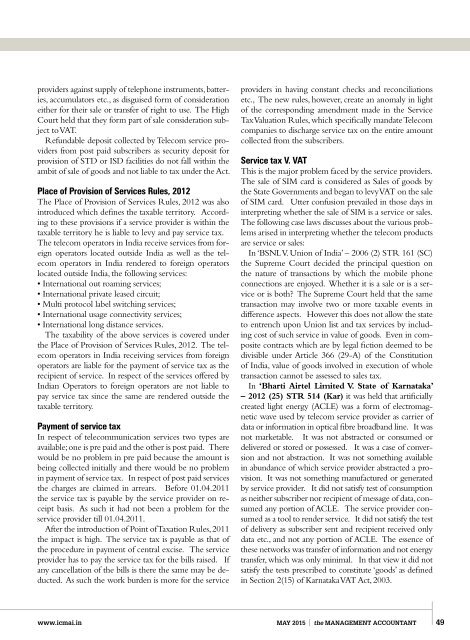May-2015
May-2015
May-2015
You also want an ePaper? Increase the reach of your titles
YUMPU automatically turns print PDFs into web optimized ePapers that Google loves.
providers against supply of telephone instruments, batteries,<br />
accumulators etc., as disguised form of consideration<br />
either for their sale or transfer of right to use. The High<br />
Court held that they form part of sale consideration subject<br />
to VAT.<br />
Refundable deposit collected by Telecom service providers<br />
from post paid subscribers as security deposit for<br />
provision of STD or ISD facilities do not fall within the<br />
ambit of sale of goods and not liable to tax under the Act.<br />
Place of Provision of Services Rules, 2012<br />
The Place of Provision of Services Rules, 2012 was also<br />
introduced which defines the taxable territory. According<br />
to these provisions if a service provider is within the<br />
taxable territory he is liable to levy and pay service tax.<br />
The telecom operators in India receive services from foreign<br />
operators located outside India as well as the telecom<br />
operators in India rendered to foreign operators<br />
located outside India, the following services:<br />
• International out roaming services;<br />
• International private leased circuit;<br />
• Multi protocol label switching services;<br />
• International usage connectivity services;<br />
• International long distance services.<br />
The taxability of the above services is covered under<br />
the Place of Provision of Services Rules, 2012. The telecom<br />
operators in India receiving services from foreign<br />
operators are liable for the payment of service tax as the<br />
recipient of service. In respect of the services offered by<br />
Indian Operators to foreign operators are not liable to<br />
pay service tax since the same are rendered outside the<br />
taxable territory.<br />
Payment of service tax<br />
In respect of telecommunication services two types are<br />
available; one is pre paid and the other is post paid. There<br />
would be no problem in pre paid because the amount is<br />
being collected initially and there would be no problem<br />
in payment of service tax. In respect of post paid services<br />
the charges are claimed in arrears. Before 01.04.2011<br />
the service tax is payable by the service provider on receipt<br />
basis. As such it had not been a problem for the<br />
service provider till 01.04.2011.<br />
After the introduction of Point of Taxation Rules, 2011<br />
the impact is high. The service tax is payable as that of<br />
the procedure in payment of central excise. The service<br />
provider has to pay the service tax for the bills raised. If<br />
any cancellation of the bills is there the same may be deducted.<br />
As such the work burden is more for the service<br />
providers in having constant checks and reconciliations<br />
etc., The new rules, however, create an anomaly in light<br />
of the corresponding amendment made in the Service<br />
Tax Valuation Rules, which specifically mandate Telecom<br />
companies to discharge service tax on the entire amount<br />
collected from the subscribers.<br />
Service tax V. VAT<br />
This is the major problem faced by the service providers.<br />
The sale of SIM card is considered as Sales of goods by<br />
the State Governments and began to levy VAT on the sale<br />
of SIM card. Utter confusion prevailed in those days in<br />
interpreting whether the sale of SIM is a service or sales.<br />
The following case laws discusses about the various problems<br />
arised in interpreting whether the telecom products<br />
are service or sales:<br />
In ‘BSNL V. Union of India’ – 2006 (2) STR 161 (SC)<br />
the Supreme Court decided the principal question on<br />
the nature of transactions by which the mobile phone<br />
connections are enjoyed. Whether it is a sale or is a service<br />
or is both? The Supreme Court held that the same<br />
transaction may involve two or more taxable events in<br />
difference aspects. However this does not allow the state<br />
to entrench upon Union list and tax services by including<br />
cost of such service in value of goods. Even in composite<br />
contracts which are by legal fiction deemed to be<br />
divisible under Article 366 (29-A) of the Constitution<br />
of India, value of goods involved in execution of whole<br />
transaction cannot be assessed to sales tax.<br />
In ‘Bharti Airtel Limited V. State of Karnataka’<br />
– 2012 (25) STR 514 (Kar) it was held that artificially<br />
created light energy (ACLE) was a form of electromagnetic<br />
wave used by telecom service provider as carrier of<br />
data or information in optical fibre broadband line. It was<br />
not marketable. It was not abstracted or consumed or<br />
delivered or stored or possessed. It was a case of conversion<br />
and not abstraction. It was not something available<br />
in abundance of which service provider abstracted a provision.<br />
It was not something manufactured or generated<br />
by service provider. It did not satisfy test of consumption<br />
as neither subscriber nor recipient of message of data, consumed<br />
any portion of ACLE. The service provider consumed<br />
as a tool to render service. It did not satisfy the test<br />
of delivery as subscriber sent and recipient received only<br />
data etc., and not any portion of ACLE. The essence of<br />
these networks was transfer of information and not energy<br />
transfer, which was only minimal. In that view it did not<br />
satisfy the tests prescribed to constitute ‘goods’ as defined<br />
in Section 2(15) of Karnataka VAT Act, 2003.<br />
www.icmai.in<br />
MAY <strong>2015</strong> the MANAGEMENT ACCOUNTANT 49


